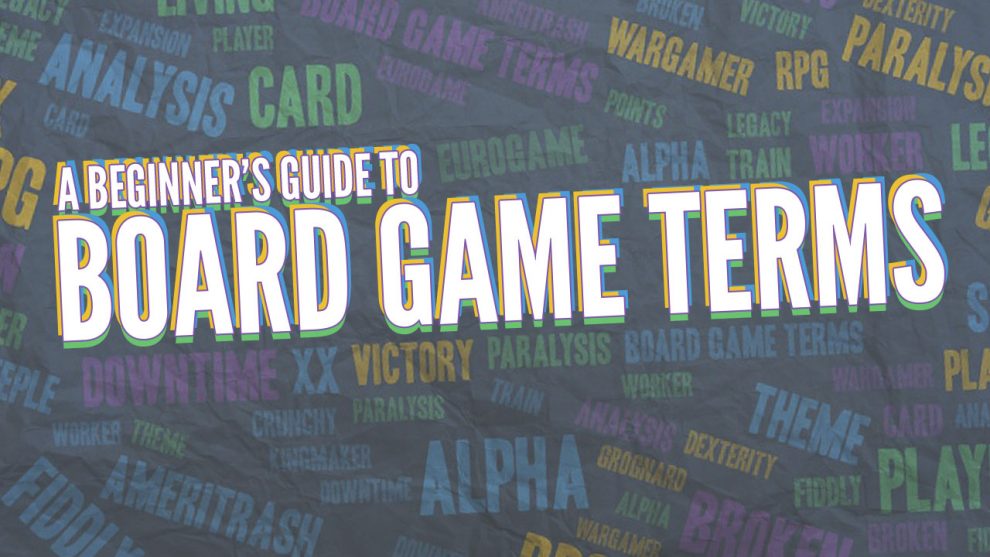The board gaming community can be challenging to break into. If you’re new to the hobby you may be confused by some of the terms and acronyms being used. Well, let me assuage your fears and equip you to enter even the geekiest of conversations.
Study this list of definitions for common board game speak, so you can stop feeling foolish and jump into geekdom head first. These aren’t the type of definitions you might find in a board game glossary, but here is what gamers actually mean when they use these terms.
Alpha-Player – Someone who enjoys playing games alone…but with friends.
Ameritrash – A game whose flavor text is more developed than its mechanics, which primarily involve rolling dice, reading, rolling more dice, and praying something good (or interesting) happens.
Analysis Paralysis (AP) – Describes when someone makes the most obvious move on their turn, but only after considering every other possible move for their current and all future turns.
Broken – A word used to describe any strategy that worked better than yours.
Crunchy – A way of describing a game with many small pieces that need to be stored in bowls, thus making it similar to breakfast cereal.
Dexterity Games – Games for kids and people who don’t know how to play real games. I think most of them involve throwing pieces around or something.
Downtime – The amount of time you have between turns to talk and get a snack instead of planning your next turn.
Eurogame – A game where you silently move bits around on personal player boards. Player interaction consists of occasionally uttering a complaint that someone made your plans less efficient, forcing you to recalculate your entire turn (see analysis paralysis).
Expansion – A piece of a game that comes out after the “main” game and actually makes it fun.
Fiddly – A game that, much like a fiddle, is extremely unpleasant for everyone when someone inexperienced tries to play it.
Grognard/Wargamer – Someone who insists their gaming taste is superior to yours because the games they like are more complicated and obscure.
Kingmaker – The jerk that decides you don’t get to win the game.
Legacy Game – A game that lets you live out the fantasy of spending lots of money on something, using it once, and breaking it on purpose.
Living Card Game – A massive card game with a monthly payment plan.
RPG – An acronym for “really popular game” coined during the 80’s Dungeons & Dragons craze that served as a way of categorizing any popular video or board game whose genre wasn’t clearly defined. It was originally believed to stand for “role-playing game” until people realized that this applied to every game ever made.
Shelf of Shame – A caption used on an image of your game collection to humbly brag about the number of board games you own.
Theme – A subject arbitrarily pasted on to a game to make the mechanics easier to understand.
Train Game – A game about trains.
18xx – Originally written as “18x”, these are games about trains that take 18x longer than regular train games. 18xx was a common typo that eventually stuck.
Victory Points – A unit of measurement used to calculate your relative intelligence compared to that of your friends.
- Note: Any game that does not include victory points or a similar measurement to determine a winner is not a real game/ This includes co-op games and any game that can end in a tie.
Worker Placement – A synonym of action selection, rondel, dice drafting, or any other game mechanic that involves actions and pieces according to most reviewers and BoardGameGeek users.
Congratulations, you are now an educated gamer. Go get your game on!








Now I’m ready to get my game on.
Nicely done!!!
Consider adding terms ‘deck-builder’, ‘4X’
Great job 🙂
Hah, great suggestions. The simple ones have the most potential for amusing alternates.
That is a surprisingly accurate list of definitions. I think the one that hit me in my funny-bone the hardest was “Living Card Game” — I mean, DAMN! That is just the most perfect definition of that term I have ever read. 🙂
I thought that this was a serious piece. A sadly wasted opportunity.
You say “wasted”, we say “laughter cures coronavirus”.
But for real, we have a serious piece in the works as well.
A second article where the ‘serious’ definitions of these terms would be simple enough to do, I think. 🙂
“Worker Placement – A synonym of action selection” that’s not true though.. Worker Placement is a sub-type of action selection.
Also you mention rondel in that sentence but you don’t have a definition of it in the article.
I’d highly recommend Geoff Engelstein’s book “Building blocks of Table Top Design” a great read for anyone who’s interested in mechanisms.
Good suggestion Mihail.
In fact we previously reviewed Building Blocks of Tabletop Game Design.
Yes, and that was an excellent review, too.
I can understand that the definition in the article is not accurate. But it was never intended to be. It was intended to be humorous, and it succeeded in that goal. I guess I am just saying that pointing out the inaccuracies of a satirical/humorous article seems a bit strange. IMVHO, YMMV, yadda, yadda, yadda…
Thanks for not putting me down for completely missing the satire the first time ?
We all get caught sometimes. 😀
🙂
Could I add;
Simulation – a term used by Grognards (see above) to signal that what they do is not so trivial as to actually play games.
Good one. 🙂
The author of this piece needs to start up a living web-page (I would not go so far as to use a Wiki, I think) of these types of terms where new ones can be added and the list can grow…
Yes! Definiton 2: a term used by the military and other serious organizations to justify playing games as a forecasting method.
I need a word for a gamer, who upon losing a close game, wants to engage in a long debate about how one move, one roll, or one thing that generally went against him most certainly kept him from victory.